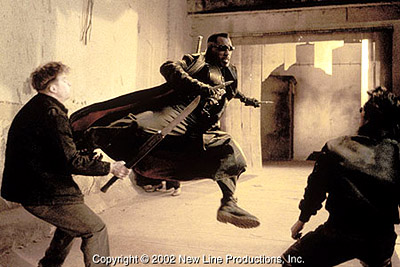
| Humanism
On The Ropes Media in the Age of Terror by Don Thompson First Published 2003 |
|
Humanism
has been getting a bad rap lately. After relentless hammering by
the religious right, who determined sometime after World War II
that "secular humanism" and the United Nations were forming a unholy
alliance to undermine the moral fabric of the globe, humanist values
are definitely on the wane. In this long-standing cultural argument,
it seems that the religious right may be winning. Humanists, particularly
in the United States, are on the run or in retreat, and this reflects
in many camps, not the least of which is media and film. Increasingly
conservative media commentators can seemingly bowl over anybody
with their aggressive demeanor and strong beliefs, particularly
wimpy liberal humanistic nice guys who question the veracity of
such Everyone
in the US seems to finally be getting on the same page: what matters
is strength and power, and the weak will get pushed aside in the
natural order of things. Blade II and Survivor, with
their strong over the weak message, have taken The co-opting by the right of the media can best be seen in the total lack of any representation of true leftists. The "anti globalization" types don't even make the radar screen (although you do see token images of anti-war protesters once in awhile), while G. Gordon Liddy shows up on CNN Money Line pitching his book about how we're losing our civil liberties to gun laws. By the way, I'm sure G. Gordon's appeal is quite broad. Along with Bible-toting Deer Hunters, a lot of atheistic skinheads, whether of the urban or rural kind, must love G. Gordon. In
short, combine enough jaded cynics with enough pious conservatives,
and value-based humanistic normalcy gets squeezed out by a media
smelling a ratings bonanza in a new world order based on a combination
of aggressive conservatism and corporate-driven (and youth targeted)
nihilism. The only faintly humanistic sentiments one will encounter
in prime time are from advertisements that promote how corporate
globalism is creating one happy human family (but some of those
companies, like Global Crossing, are defunct so As
far as the religious right, they've got their own TV and movies
(Jonah: A Veggie Tale) and books (The Ressurectionists)
and gated communities in Colorado and Texas, and can just shut everything
out with Internet filters and V-chips. They apparently do come out
of hiding in droves on But what is this humanism stuff anyway? Simply put, humanism has at its core a belief that human beings all have an essential value, and that evil doesn't' exist per se, but only in evil actions based on hatred. Thus hatred becomes the true evil, not people. Moreover, we must choose not to hate. Humanism is based on the belief that love and human connections must be proactively supported and created through human effort in education, the arts, human centered government policy, and reaching out to find common ground. Now doesn't that all sound very radical, weak, horrible, and well, humanistic? Well, it's considered normal in Europe. But not so according to almost everyone you talk to in the U.S. where such center to left leanings can label you patently un-patriotic. Ironically, as the right wing keeps the government out of such things the culture business, Hollywood steps in to fill the gap based on market economics, or worse, corporate non-values masking as the market. Want to thank somebody for stupid films, TV and music that emphasizes mindless violence, shallow sex and cardboard characters: thank your local conservative who keeps government large and small from investing in "non commercial" artists who might create an alternative to buck this trend. We talk about 100,000 cops on the street and Homeland Security, how about 1000 humanistic independent low budget digital films to provide the fuel for cultural health and offer the world an alternative view of our sensation-obsessed American culture? But no, we prefer the market, a "reality" often skewed by corporate exigencies, and these so-called market forces often lead us to the least common denominator, not risk taking creative vision. And the more conservatives try to rid us of media ills through fundamentalist moralizing, the worse it gets. Take Monica Lewinski: the conservatives go after Clinton for sex, and create a sexual revolution in the media as a result. Once the semen stained Blue Dress hit NBC news, it was all over. The result is Extreme Dating and the Anna Nichole Show. In the new media order, stimulation replaces feeling, and heroes and villains become the only acceptable moral guideposts. Heroes and villains. On daytime talk shows, people try to show how they are "right" or they've been "wronged." Heroes and villains, and their corollaries, winners and losers and of course -- victims. In films, in foreign policy, in the crime dramas, in law suit insanity, in the gross out comedies, in the news, because the media (fiction and non-fiction alike) wants to tell good stories and good stories are always based on heroes and villains. The result is that entertainment and reality blur. Will the War on Terror morph into the ultimate reality series? It makes sense: according to the Village Voice, the U.S. military funded the prototypes of many of what became the ultra violent video games. Now
there are of course still examples of humanism in film and media,
but they continue to wane. What are those examples? For one, Dead
Disturbing as it might be to many, some of the most humanistic films of the decade have come from one of our bitter enemies and member of the "axis of evil": Iran. A Time for Drunken Horses, Children of Heaven, The Color of Paradise. How is it that such a patently "evil" country such as Iran can deliver to us such sweet notions of simple humanity in the face of poverty and suffering? It is because, for one, these societies still suffer on a basic level, and understand they can't deny suffering as some kind of perennial disease to be drugged into non-existence either through television or Prozac. Suffering is, as they Buddhist's say, the first noble truth. It is through staying in touch with that essential fact that we stay in touch with our humanity. In seeking to eliminate suffering with an answer wholly material, Americans can also eliminate love and compassion, which can rise from that suffering, and may in fact be the key to sufferings' true cure. And still, we are a great nation, and capable of much good -- and perhaps even a renaissance of humanism. At least I want to believe that, although it becomes harder for me to believe that all the time. If
voices of humanistic balance do not rise in greater numbers, I fear
for our country and our future. We will likely not win the long
term war on terrorism (will it last forever?), because we are quickly
losing the moral -- Don Thompson Discuss this article on the nextPix FORUM by going to its discussion thread: [click here] Don
Thompson is a filmmaker/producer and co-founder of SolPix. You can
find out more about Don by going to the website for his production
company nextpix.
You can also email him at don@nextpix.com
Copyright Web del Sol, 2003 |

| |
 |
Euro Screen Writers Articles on Euro film, research, plus a great cache of interviews with such directors as Godard, Besson, Agnieszka Holland, Peter Greenway, and Fritz Lang. |
 |
Done Deal: A current list of the latest industry script sales. |
 |
UK's Film Unlimited Truly unlimited, one of the best film sites going. Plenty of news, reviews, special reports, features, and PREVIEWS |
 |
Screen Writer's Utopia! What are they, who wrote them, who's doing them, and what you can expect. |
 things
as the war against Iraq. Combine this with a cable TV centric youth
culture (at least the one created by adult-owned corporate media
such as MTV) that seems bent on embracing cynically motivated "extreme"
non-values -- well that spells trouble for humanists. One of the
last bastions of mainstream media humanism, Disney, has even gotten
so cynical that its most compelling protagonists are Toys or Monsters.
Both Toy Story and Monsters, Inc. got it right --
the real monsters are the consumer crazed kids.
things
as the war against Iraq. Combine this with a cable TV centric youth
culture (at least the one created by adult-owned corporate media
such as MTV) that seems bent on embracing cynically motivated "extreme"
non-values -- well that spells trouble for humanists. One of the
last bastions of mainstream media humanism, Disney, has even gotten
so cynical that its most compelling protagonists are Toys or Monsters.
Both Toy Story and Monsters, Inc. got it right --
the real monsters are the consumer crazed kids.  front
and center as the icons of modern U.S. pop culture. More often,
the weak are the humanists, or maybe in the case of Blade,
humanist vampires. The conservatives and the cynics, well, they're
all the new men of action, and with GW Bush as their front guy,
they get all the media play nowadays, protecting us from "unforeseen
events that may or may not occur."
front
and center as the icons of modern U.S. pop culture. More often,
the weak are the humanists, or maybe in the case of Blade,
humanist vampires. The conservatives and the cynics, well, they're
all the new men of action, and with GW Bush as their front guy,
they get all the media play nowadays, protecting us from "unforeseen
events that may or may not occur."
 don't
do that anymore). Feelings of human connectedness we used to get
from positive message films like Field of Dreams can only
be found in commercials for IBM. But what about counter culture?
What used to be considered "counter culture" has morphed into "extreme"
and is now so co-opted by the marketing machine of US entertainment
conglomerates so much that what was once contrarian is now conformist.
To be decadently hip and cool is in fact normal, and Howard Stern
is no longer a rebel, but the pioneer of the new nihilist elite.
Moreover, hipness is often associated with violence, rooted in hyper-violent
video games such as Grand Theft Auto and films like The
Fast and The Furious and XXX. Thus the new "counter culture"
fuels the youth hungry military machine in stead of rebelling against
it, and George Patton is smiling down on us from heaven. And if
you're looking for Ozzie and Harriet, well they're long gone, except
on Nickelodeon. Witness the newly "normal" Ozzie -- that
is of the Osborne variety.
don't
do that anymore). Feelings of human connectedness we used to get
from positive message films like Field of Dreams can only
be found in commercials for IBM. But what about counter culture?
What used to be considered "counter culture" has morphed into "extreme"
and is now so co-opted by the marketing machine of US entertainment
conglomerates so much that what was once contrarian is now conformist.
To be decadently hip and cool is in fact normal, and Howard Stern
is no longer a rebel, but the pioneer of the new nihilist elite.
Moreover, hipness is often associated with violence, rooted in hyper-violent
video games such as Grand Theft Auto and films like The
Fast and The Furious and XXX. Thus the new "counter culture"
fuels the youth hungry military machine in stead of rebelling against
it, and George Patton is smiling down on us from heaven. And if
you're looking for Ozzie and Harriet, well they're long gone, except
on Nickelodeon. Witness the newly "normal" Ozzie -- that
is of the Osborne variety.
 election
day, while humanists grouse about how "they don't make a difference."
The religious right has basically given up on secular media and
entertainment. In fact, religious types love the newly degenerate
mainstream, as it proves their point that the country is going to
hell and must be saved by ever more right leaning politics (with
the war on terror, many in the middle are becoming scared into following
them). And since degeneracy-as-entertainment seems to sell nowadays,
corporations are raking in the cash, so everybody's happy.
election
day, while humanists grouse about how "they don't make a difference."
The religious right has basically given up on secular media and
entertainment. In fact, religious types love the newly degenerate
mainstream, as it proves their point that the country is going to
hell and must be saved by ever more right leaning politics (with
the war on terror, many in the middle are becoming scared into following
them). And since degeneracy-as-entertainment seems to sell nowadays,
corporations are raking in the cash, so everybody's happy.
 Man
Walking, a film that forgives the murderer and sees in his eyes
human value, and the value of love. Or Kenneth Lonnergan's You
Can Count On Me, a film that shows the subtleness of human interaction
in a way that informs and enlightens our own lives. Or, believe
it or not, 40 Days and 40 Nights, a film that posits the
value of connection as paramount over sex for sex's sake and displays
the potential for a comedic mainstream film to lean toward the humanistic.
As for television, much of the programming on PBS is another example
(although Bill Moyers has been under fire lately). If
you want to check out classic films that define humanism, take a
look at High and Low, Kurosawa's masterpiece that forces
the central character to face his tormenter, and realize that the
tormenter is in fact the tormented. Or Bicycle Thief, De
Sica's impassioned plea for social justice that rose out of the
rubble of World War II.
Man
Walking, a film that forgives the murderer and sees in his eyes
human value, and the value of love. Or Kenneth Lonnergan's You
Can Count On Me, a film that shows the subtleness of human interaction
in a way that informs and enlightens our own lives. Or, believe
it or not, 40 Days and 40 Nights, a film that posits the
value of connection as paramount over sex for sex's sake and displays
the potential for a comedic mainstream film to lean toward the humanistic.
As for television, much of the programming on PBS is another example
(although Bill Moyers has been under fire lately). If
you want to check out classic films that define humanism, take a
look at High and Low, Kurosawa's masterpiece that forces
the central character to face his tormenter, and realize that the
tormenter is in fact the tormented. Or Bicycle Thief, De
Sica's impassioned plea for social justice that rose out of the
rubble of World War II.
 authority
to win any war, at any time. Certainly not pre-emptive wars that
skirt international law. In the short term we may win battles, but
the long-term war will be lost, primarily by our own hand. We may
have lost it already.
authority
to win any war, at any time. Certainly not pre-emptive wars that
skirt international law. In the short term we may win battles, but
the long-term war will be lost, primarily by our own hand. We may
have lost it already.
